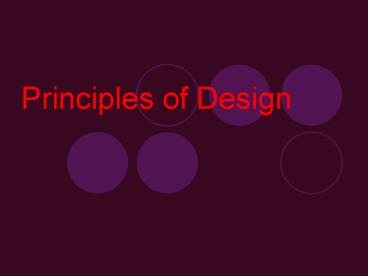Principles of Design - PowerPoint PPT Presentation
1 / 46
Title:
Principles of Design
Description:
... Ruth Duckworth Repetition an Element of art used over and over and over and over again Repetition Louise Nevelson Dale Chihuly Repetition Andy Goldsworthy ... – PowerPoint PPT presentation
Number of Views:173
Avg rating:3.0/5.0
Title: Principles of Design
1
Principles of Design
2
Principles of Design
- The ART ELEMENTS (line, shape, color, value,
texture, form and space) combine to form the
PRINCIPLES OF DESIGN
3
Contrast
- Opposites - A large difference between two
things for example, hot and cold, green and red,
light and shadow, smooth and rough, organic and
geometric
B L A C K
W H I T E
4
Contrast
5
Contrast
Richard Deacon
6
Contrast
7
Contrast
Ruth Duckworth
8
Repetition
- an Element of art used over and over and over
and over again
9
Repetition
Louise Nevelson
Dale Chihuly
10
Repetition
Andy Goldsworthy
11
Repetition
12
Repetition
13
Repetition
Tony Cragg
14
Repetition
Alexander Calder
15
Repetition
16
Pattern
- With repetition, a pattern can be created. Any
element can be repeated to form a pattern line,
shape, color, value, texture
17
Kandinskys Concentric Circles
18
MC Escher Tessellation
19
Pattern
20
Pattern
21
Pattern
22
Pattern
Aino Kajaiemi
Lauren Clay
23
Pattern
24
Movement
- To create the illusion of action and a sense of
motion - guides the viewer's eyes throughout the artwork
Barbara Hepworth
25
Movement
Giacomo Balla
Umberto Boccioni
26
Movement
EvolutionofGenius.com
Ruth Duckworth
27
Movement
Jen Stark
Dale Chihuly
28
Movement
29
Movement
Sydney Opera House
30
Movement
Tony Cragg
Jennifer McCurdy
31
Balance
- Arranged elements so that no one part seems
heavier or overpowers another - Symmetrical Balance - one side duplicates
- or mirrors the other
- Asymmetrical Balance - one side differs from the
other - Radial Symmetry - similar parts regularly
arranged around a central axis
32
Symmetrical Balance
Su Blackwell
Ferry Staverman
Peter Beasecker
33
Asymmetrical Balance
Scott Bennett
Tony Cragg
34
Radial Balance
Angela O'Kelly
Richard Sweeney
Jen Stark
35
Proportion
- the size relationship of one part to the whole
of an object
36
Proportion
Alberto Giacometti
Michelangelo
37
Proportion
Anish Kapoor
38
Proportion
39
Proportion
Donald Lipski
40
Variety
- The combination of different elements of art
- The opposite of variety is unity
Barbara Hepworth
Jen Stark
41
Variety
Sol LeWitt
Louise Nevelson
42
Unity
- the look of completeness or wholeness
- A totality that combines all of its parts into
one complete, cohesive whole.
Alexander Calder
Richard Deacon
43
Unity
Sol LeWitt
44
Emphasis
- points of interest that pull the viewer's eye to
important parts
Scott Bennett
45
Emphasis
46
Umberto Boccioni































